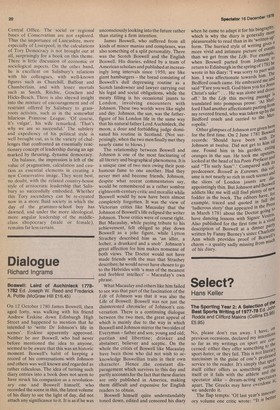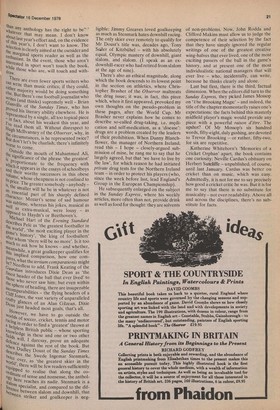Select?
Hans Keller
The Sporting Year 2: A Selection of them Best Sports Writing Rodda and Clifford Makins (Collins 0.95) of 1977-78 Ed. Jral No, please don't run away. I have, Oil s previous occasions, declared my intent11, so far as my writings on sport are Ccf)he cerned: either they offer something to sport-hater, or they fail. This is not liter narcissism in the guise of one's professeft itself to the reader. It's simply that sPt either offers us something °Iitsigh: itself or it fails with the athlete and tn. 5 spectator alike — dream-acting sPectat°.r.. apart. The Greeks may have overdone 1" we underdo it. The flap tempts: 'Of last year's inh°vat; ory volume one critic wrote: "It is bete 8Plictator 16 December 1978 than any anthology has the right to be" Whatever that may mean. I don't know about last year's effort and, on the evidence of this year's, I don't want to know. The selection is clearly aimed at the outsider and the marginal sports reader as well as the 1.1thusiast. In the event, those who aren't Interested in sport won't touch the book, While those who are, will touch and with draw.
There are even fewer sports writers who ean write than music critics; if they could, either majority would be doing something else. But there's one football journalist who writes (and thinks) supremely well — Brian Glanville of the Sunday Times, who has proved his literary ability elsewhere. He is represented by a single, all too topical piece "I.)" fact, about his weakest this year, and I've read them all. Without disrespect to 'nigh MeIlvanney of the Observer, why, in the circumstances, is he represented twice? at don't let's be churlish; there's infinitely worse to come. I, Outside the mouth of Muhanimed Ali, he significance of the phrase 'the greatest' Is Proportionate to the frequency with Which it appears in the essays of schoolboys and their worthy successors in this obese olunte, whose cheapness is not confined to !ts price. The greater somebody —anybody's' the smaller will he be in whatever is not an essential part of his sharply defined character: Mozart's sense of sad humour was sublime, whereas his jokes, musical as Well as extra-musical, were lousy — as °PPosed to Haydn's or Beethoven's. Michael Hart of the Evening Standard describes Pele as 'the greatest footballer in the world', 'the most exciting player in the, 8,a,Ine's history', 'the king of footballers "ter whom 'there will be no more'. Is it too 1 Much to ask how he knows — and whether, The. anwhile, a great goalkeeper qualifies for this implied comparison, how one corn what the tertium comparationis might ' Needless to add, Frank Keating of the ‘-■„.14ardian introduces Dixie Dean as 'the Ilitest header of the ball that ever lived' to those who never saw him; but even within iHe sphere of heading, there are insuperable — the flying headers of a Cliff Jones, the vast variety of unparalleled raftY glances of an Alan Gilzean. Dixie bean just headed most goals, that's all.
Worlds we have to go outside the r odds , of soccer, cricket, tennis and motor aa,_elog in order to find a 'greatest' thrown at aelpless British public — whose sporting fie in these and one or two other / (rids Will, I daresay, prove an adequate werenee against the rest of the book. But hen Dudley Doust of the Sunday Times tthese. ribes the Swede Ingemar Stenmark, ;Ice over, as 'the greatest skier in the e , there will be few readers sufficiently ,clniPped to realise that along the co"ordinate of sense and nonsense, the antholsp here reaches its nadir. Stenmark is a fearl°111 sPecialist, and compared to the difference between slalom and downhill, that 'ween striker and goalkeeper is neg ligible: Jimmy Greaves loved goalkeeping as much as Stenmark hates downhill racing. The only skier ever remotely to qualify for Mr Doust's title was, decades ago, Tony Sealer of Kitzbiihel — with his absolutely equal, Olympic mastery of downhill, giant slalom, and slalom. (I speak as an exdownhill-racer who had retired from slalom at the age of nine).
There's also an ethical magnitude, along which the book descends to its lowest point in the section on athletics, where Christopher Brasher of the Observer maltreats the drug issue; it was, in fact, this piece which, when it first appeared, provoked my own thoughts on the pseudo-problem in these pages, after the World Cup. Mr Brasher never explains how he comes to describe so-called drug-taking, i.e. medication and self-medication, as a 'disease': drugs are a problem created by the leaders of their prohibition. When Danny Blanchflower, the manager of Northern Ireland, read this — I hope — closely-argued submission of mine, he rang me to say that he largely agreed, but that 'we have to live by the law', for which reason he had initiated private drug tests for the Northern Ireland team — in order to protect his players (who, since the week before last, lead England's Group in the European Championship).
He subsequently enlarged on the subject in the Sunday Express, where his weekly articles, more often than not, provide drink as well as food for thought: they are solvents of non-problems. Now, John Rodda and Clifford Makins must allow us to judge the competence of their selection by the fact that they have simply ignored the regular writings of one of the greatest creative wing-halves that ever lived, one of the most exciting passers of the ball in the game's history, and at present one of the most individualistic national managers that will ever live — who, incidentally, can write, because he thinks clearly and alone.
Last but first, there is the third, factual dimension. When the editors did turn to the Sunday Express, they picked James Mossop on '[he Brooking Magic' — and indeed, the title of the chapter momentarily raises one's expectations: the facts behind this masterly midfield player's magic would.provide any piece with a powerful raison d'être. The upshot? Of Mr Mossop's six hundred words, fifty-eight, duly gushing, are devoted to Trevor Brooking — or rather, fifty-two, for six are repetitive.
Katherine Whitehorn's 'Memories of a Cricket Orphan' apart, the book contains one curiosity: Neville Cardus's obituary on Herbert Sutcliffe — unpublished, of course, until last January. Cardus was better on cricket than on music, which was easy. Admittedly, it is not for me to say precisely how good a cricket critic he was. But it is for me to say that there is no substitute for musicality — not even readability. Above all and across the disciplines, there's no substitute for facts.



































 Previous page
Previous page